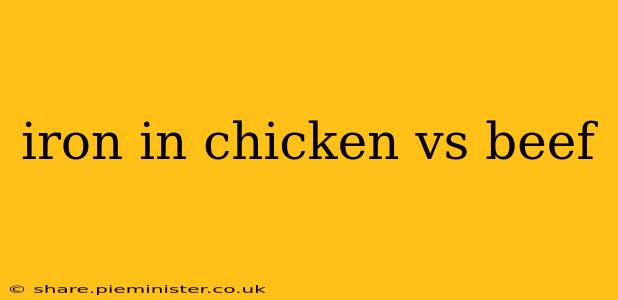Iron is a vital mineral crucial for carrying oxygen throughout the body, supporting energy production, and maintaining a healthy immune system. Both chicken and beef are excellent sources of iron, but they offer different types and amounts, impacting their bioavailability – how easily your body absorbs the iron. This detailed comparison will explore the iron content in chicken versus beef, helping you make informed choices for a healthy diet.
How Much Iron is in Chicken and Beef?
The iron content in chicken and beef varies depending on the cut, preparation method, and animal's diet. Generally:
-
Beef: Beef is significantly richer in iron than chicken. A 3-ounce serving of lean ground beef can contain around 3 mg of iron, while a similar serving of sirloin steak may provide even more. The iron in beef is primarily heme iron.
-
Chicken: Chicken contains less iron than beef. A 3-ounce serving of cooked chicken breast typically contains approximately 1 mg of iron. The iron in chicken is also heme iron, but in a smaller quantity.
Heme vs. Non-Heme Iron: It's important to understand the difference. Heme iron, found in animal products like beef and chicken, is more readily absorbed by the body than non-heme iron, found in plant-based foods. This is a crucial factor when comparing the two.
Which is Better for Iron Absorption?
While both contain heme iron, beef generally provides a more significant and readily absorbed amount of iron. The higher concentration of heme iron in beef means your body can utilize a larger portion of the iron present. However, individual absorption rates can vary depending on factors such as overall diet and gut health.
What Other Factors Affect Iron Absorption?
Several factors beyond the type of meat influence iron absorption:
-
Vitamin C: Consuming foods rich in vitamin C alongside iron-rich meals significantly enhances absorption. Consider adding citrus fruits, peppers, or strawberries to your meals.
-
Phytates: Found in grains and legumes, phytates can inhibit iron absorption. Separating iron-rich meals from high-phytate foods can improve uptake.
-
Tannins: Found in tea and coffee, tannins can also hinder iron absorption. Avoid consuming these beverages immediately before or after meals containing iron.
Is Chicken a Good Source of Iron?
Yes, chicken is a good source of iron, especially when considering its overall nutritional profile. While it contains less iron than beef, it's still a valuable contributor to your daily intake, particularly when combined with foods that enhance absorption. Chicken is also a lean protein source, lower in fat than many beef cuts.
Is Beef a Better Source of Iron Than Chicken?
Yes, beef generally provides a greater quantity of more readily absorbed heme iron compared to chicken. This makes it a potentially superior choice for individuals needing to increase their iron intake. However, choosing lean cuts and being mindful of portion sizes are important considerations.
What are the Best Cuts of Beef and Chicken for Iron?
For maximizing iron intake:
-
Beef: Lean cuts like sirloin, tenderloin, and eye of round are good choices. Choose lean ground beef over higher-fat options.
-
Chicken: Chicken breast, while slightly lower in iron than some darker meat cuts, is a generally healthier and leaner option.
How Can I Increase My Iron Intake?
Beyond choosing iron-rich meats, consider these strategies:
-
Eat iron-rich plant foods: Beans, lentils, spinach, and fortified cereals contribute non-heme iron to your diet.
-
Combine iron-rich foods with vitamin C-rich foods: This significantly boosts absorption.
-
Limit intake of inhibitors: Reduce consumption of tea, coffee, and high-phytate foods near mealtimes.
-
Consult a doctor: If you suspect iron deficiency, consult your physician for testing and personalized recommendations. They may recommend an iron supplement.
By understanding the nuances of iron content in chicken and beef, along with factors that influence absorption, you can make informed choices to optimize your iron intake and support your overall health. Remember to consult with a healthcare professional or registered dietitian for personalized dietary advice, especially if you have concerns about iron deficiency or specific dietary needs.
